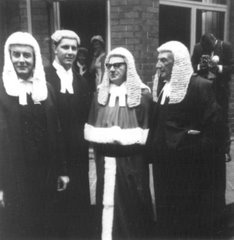 10. Adolf Hitler. I wanted to keep him of this list, but it would be dishonest. The slim shrub of hair on his upper lip barely counts as a moustache--it's more like a northerly soul patch than anything else. And yet Hitler owns it. In the sixty years since Hitler's death, no one has worn "the Hitler" except Hitler impersonators. No other facial hair style can possibly evoke such horror.
10. Adolf Hitler. I wanted to keep him of this list, but it would be dishonest. The slim shrub of hair on his upper lip barely counts as a moustache--it's more like a northerly soul patch than anything else. And yet Hitler owns it. In the sixty years since Hitler's death, no one has worn "the Hitler" except Hitler impersonators. No other facial hair style can possibly evoke such horror. 9. Joseph Stalin. Let's dispense with the dictators. Martin Amis has a terrific passage in Koba The Dread where he compares the evils of "The Big Moustache and the Little Moustache." Brief recap: Hitler was worse, but Stalin's moustache was better.
9. Joseph Stalin. Let's dispense with the dictators. Martin Amis has a terrific passage in Koba The Dread where he compares the evils of "The Big Moustache and the Little Moustache." Brief recap: Hitler was worse, but Stalin's moustache was better.  8. Genghis Khan. Damn, what is it with moustaches and evil conquering assholes? I'm guessing that Genghis didn't actually, uh, sit for this portrait -- and some representations of him show a full beard -- but I'm going to give it to him anyway. That mean slope on those whiskers says only one thing: Tatars of the steppe, you better watch your motherfucking backs.
8. Genghis Khan. Damn, what is it with moustaches and evil conquering assholes? I'm guessing that Genghis didn't actually, uh, sit for this portrait -- and some representations of him show a full beard -- but I'm going to give it to him anyway. That mean slope on those whiskers says only one thing: Tatars of the steppe, you better watch your motherfucking backs. 7. George Harrison. Not all moustaches are bloodthirsty. Who could be a better antidote to Adolf, Josef, and Genghis than The Mildest Beatle? Lots of rockers attempted the long-hair-and-stache look in the mid-70s, but few wore it better than the Dark Horse.
7. George Harrison. Not all moustaches are bloodthirsty. Who could be a better antidote to Adolf, Josef, and Genghis than The Mildest Beatle? Lots of rockers attempted the long-hair-and-stache look in the mid-70s, but few wore it better than the Dark Horse. 5. Rollie Fingers. The first closer in baseball was also the owner of the best moustache in sports history. Grab a hold of them handlebars, baby!
5. Rollie Fingers. The first closer in baseball was also the owner of the best moustache in sports history. Grab a hold of them handlebars, baby! 4. William Howard Taft. Eveybody talks about Teddy Roosevelt, but Taft was our last president with facial hair. His moustache also kicks the hell out of T.R.'s comparatively feeble whiskers. Who doesn't love a fat man with a bushy mustache? It's possible that William Howard Taft came closer to looking like an actual walrus than any human being in human history.
4. William Howard Taft. Eveybody talks about Teddy Roosevelt, but Taft was our last president with facial hair. His moustache also kicks the hell out of T.R.'s comparatively feeble whiskers. Who doesn't love a fat man with a bushy mustache? It's possible that William Howard Taft came closer to looking like an actual walrus than any human being in human history. Trivia: who was the last major-party presidential candidate to wear a moustache? (Answer in white) Thomas Dewey, 1948.
Incidentally, both Burt and Tom won serious cred by holding onto their whiskers well past the period of fashionability. Tom wore his well into the '90s--including his memorable guest-stint on "Friends"--and Burt was still sporting one as of the latest "Dukes of Hazzard" movie. These aren't fly-by-night facial-hair phonies, people. These are Men of the Moustache.
 1. Otto von Bismarck. I guess you could go with Chaplin or Dali or Zappa here, but while those guys were probably all assholes, the #1 moustache should go to an asshole who made war. Moustaches are apparently much more belligerent than watching a lot of gay porn might lead you to believe: Hitler, Stalin, Genghis Kahn, Bismark, Saddam Hussein, and the list goes on. I have a feeling I'm going to start acting like a total cock on New Years' Eve for no apparent reason.
1. Otto von Bismarck. I guess you could go with Chaplin or Dali or Zappa here, but while those guys were probably all assholes, the #1 moustache should go to an asshole who made war. Moustaches are apparently much more belligerent than watching a lot of gay porn might lead you to believe: Hitler, Stalin, Genghis Kahn, Bismark, Saddam Hussein, and the list goes on. I have a feeling I'm going to start acting like a total cock on New Years' Eve for no apparent reason.







